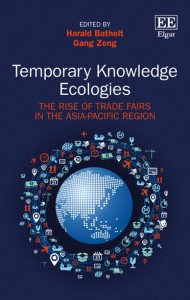
Temporary Knowledge Ecologies The Rise of Trade Fairs in the Asia-Pacific Region
The development of trade fairs in the Asia-Pacific region has been highly uneven, with large differences between industries, cities and countries. Based on a knowledge perspective, this book is the first of its kind to connect economic growth with the rise and development of trade fairs.
Using country-specific case studies, the contributors identify three key areas of exploration: knowledge generation and transfer processes through trade fairs, interrelationships between industrial and trade fair specializations, and linkages between economic development, industrial policy and trade fair dynamics. They demonstrate that trade fairs in the Asia-Pacific region have evolved from transaction-oriented places to knowledge-based and relational spaces.
Researchers and students of economic geography, political economy and related disciplines interested in exploring the role of the developmental state in the Asia-Pacific region will find this book to be highly relevant. Policy makers and regional planners seeking to understand the role of international trade fairs will also find this to be an insightful study.
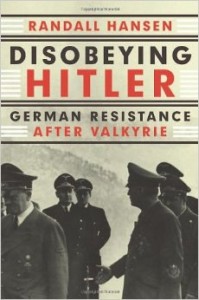
Disobeying Hitler: German Resistance after Valkyrie
On July 20, 1944, Colonel Claus Schenk Graf von Stauffenberg was executed in the courtyard of the Third Reich’s military headquarters in Berlin for attempting to assassinate Adolf Hitler. A member of the unsuccessful plot to overthrow the Nazi government — codenamed Operation Valkyrie — Stauffenberg was shot by a firing squad along with his co-conspirators, and their bodies were dumped in a shallow grave.
Most discussions of German resistance during World War II end here, with the failed July 20 plot and the subsequent execution of its leaders. And yet this was far from the last act of disobedience carried out against the Nazi regime, as Randall Hansen reveals in his fascinating new book. Although “resistance” as a commitment to regime change all but ended with Stauffenberg, Hansen shows that if we consider resistance as disobedience — of orders to detonate a bridge, to wreck a factory, to destroy a harbor or to defend a city to the last man — then a very different picture emerges. Resistance-as-disobedience continued, and indeed increased, throughout late 1944 and early 1945. And it had a more profound and lasting material effect on the war and its aftermath than did the military resistance culminating in Stauffenberg’s attempt on Hitler’s life. From the refusal to destroy Paris and key locations in southern France to the unwillingness to implement a scorched earth policy on German soil, disobedience in the Third Reich manifested in numerous ways after 1944, and ultimately impacted the course of the war by saving thousands of Allied and German lives, keeping supply lines open, and preserving cities and infrastructure.
In a period of thorough and at times fanatical obedience, the few instances of disobedience against the Nazi regime become all the more striking. Considering various forms of oppostion across the Western Front, Disobeying Hitler is a significant contribution to the literature on German resistance.
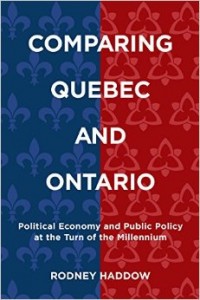
Comparing Quebec and Ontario: Political Economy and Public Policy at the Turn of the Millennium
Can sub-units within a capitalist democracy, even a relatively decentralized one like Canada, pursue fundamentally different social and economic policies? Is their ability to do so less now than it was before the advent of globalization? In Comparing Quebec and Ontario, Rodney Haddow brings these questions and the tools of comparative political economy to bear on the growing public policy divide between Ontario and Quebec.
Combining narrative case studies with rigorous quantitative analysis, Haddow analyses how budgeting, economic development, social assistance, and child care policies differ between the two provinces. The cause of the divide, he argues, are underlying differences between their political economic institutions.
An important contribution to ongoing debates about globalization’s “golden straightjacket,”Comparing Quebec and Ontario is an essential resource for understanding Canadian political economy.
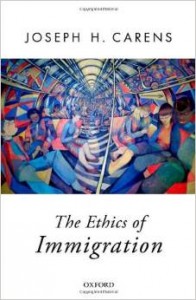
The Ethics of Immigration
In The Ethics of Immigration, Joseph Carens synthesizes a lifetime of work to explore and illuminates one of the most pressing issues of our time.
Immigration poses practical problems for western democracies and also challenges the ways in which people in democracies think about citizenship and belonging, about rights and responsibilities, and about freedom and equality. Carens begins by focusing on current immigration controversies in North America and Europe about access to citizenship, the integration of immigrants, temporary workers, irregular migrants and the admission of family members and refugees. Working within the moral framework provided by liberal democratic values, he argues that some of the practices of democratic states in these areas are morally defensible, while others need to be reformed. In the last part of the book he moves beyond the currently feasible to ask questions about immigration from a more fundamental perspective. He argues that democratic values of freedom and equality ultimately entail a commitment to open borders.
Only in a world of open borders, he contends, will we live up to our most basic principles. Many will not agree with some of Carens’ claims, especially his controversial conclusion, but none will be able to dismiss his views lightly. Powerfully argued by one of the world’s leading political philosophers on the issue, The Ethics of Immigration is a landmark work on one of the most important global social trends of our era.
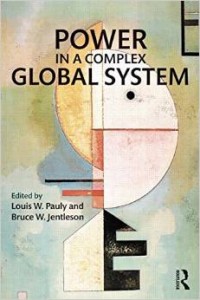
Power In A Complex Global System
Can twenty-first-century global challenges be met through the limited adaptation of existing structures of political authority and prevailing systemic norms, or is a more fundamental reconstitution necessary? Are the stresses now evident in the domestic compacts underpinning advanced societies (let alone failed and failing states) significantly more serious than in the past and capable of undermining the fundamental policy capacity of existing states and the collective instruments created by them? In this book, these questions, revolving around long-standing debates on the nature and purpose of power, are addressed at national, regional, and international levels of governance.

LAND, STEWARDSHIP, AND LEGITIMACY: ENDANGERED SPECIES POLICY IN CANADA AND THE UNITED STATES
Canada and the United States are similar in terms of the species of wildlife that mingle freely across their shared border. Despite this similarity, however, there are significant differences between approaches to wildlife management in these two nations. In Land, Stewardship, and Legitimacy, Andrea Olive examines the divergent evolution of endangered species policy on either side of the 49th parallel.
Examining local circumstances in areas as distant and diverse as southern Utah and the Canadian Arctic, Olive shows how public attitudes have shaped environmental policy in response to endangered species law, specifically the Species at Risk Act in Canada and the Endangered Species Act in the U.S. Richly researched and accessibly written, this is the first book to compare endangered species policy on both sides of the Canada–U.S. border. It will appeal to students and scholars of environmental policy, politics, and ethics, and anyone interested in current approaches to wildlife management.
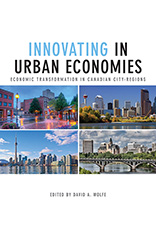
Innovating in Urban Economies: Economic Transformation in Canadian City-Regions
In a globalizing, knowledge-based economy, innovation and creative capacity lead to economic prosperity. Starting in 2006, the Innovation Systems Research Network began a six year-long study on how city-regions in Canada were surviving and thriving in a globalized world. That study resulted in the “Innovation, Creativity, and Governance in Canadian City-Regions” series, which examines the impact of innovation, talent, and institutions on sixteen city-regions across Canada. This volume explores how the social dynamics that influence innovation and knowledge flows in Canadian city-regions contribute to transformation and long-term growth.
With case studies examining cities of all sizes, from Toronto to Moncton, Innovating in Urban Economies analyzes the impact of size, location, and the regional economy on innovation and knowledge in Canada’s cities.
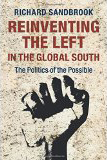
Reinventing the Left in the Global South: The Politics of the Possible
This book offers a fresh appraisal of the nature and significance of the democratic Left in the Global South. The moral and intellectual leadership of the Left is shifting south from its European birthplace. It is in the Global South, most notably in Latin America, that one finds newly self-confident progressive movements. This ‘new’ democratic Left includes parties and social movements that not only are avoiding the familiar pitfalls that ensnared socialists and social democrats in the twentieth century, but also are coping with the realities of the twenty-first century, especially neoliberal globalization. In analyzing and illustrating three innovative strategies – moderate social democracy, radical social-democratic transition to socialism, and Left populism – this study nudges the debate about the Left out of the well-worn grooves into which it has fallen in recent decades.
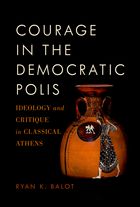
Courage in the Democratic Polis: Ideology and Critique in Classical Athens
In this compelling new study, Ryan K. Balot brings together political theory, classical history, and ancient philosophy in order to re-conceive of courage as a specifically democratic virtue. Ranging from Thucydides and Aristophanes to the Greek tragedians and Plato, Balot shows that the ancient Athenians constructed a novel vision of courage that linked this virtue to fundamental democratic
ideals such as freedom, equality, and practical rationality. The Athenian ideology of courage had practical implications for the conduct of war, for gender relations, and for the citizens’ self-image as democrats. In revising traditional ideals, Balot argues, the Athenians reimagined the emotional and cognitive motivations for courage in ways that will unsettle and transform our contemporary discourses. Without losing sight of political tensions and practical conflicts, Balot illustrates the merits of the Athenian ideal, provocatively explaining its potential to enlarge our contemporary understandings of politics and ethics. The result is a remarkably interdisciplinary work that has significant implications for the theory and practice of democracy, both ancient and modern.

Political Philosophy: What It Is and Why It Matters
What is political philosophy? Ronald Beiner makes the case that it is centrally defined by supremely ambitious reflection on the ends of life. We pursue this reflection by exposing ourselves to, and participating in, a perennial dialogue among epic theorists who articulate grand visions of what constitutes the authentic good for human beings. Who are these epic theorists, and what are their strengths and weaknesses? Beiner selects a dozen leading candidates: Arendt, Oakeshott, Strauss, Löwith, Voegelin, Weil, Gadamer, Habermas, Foucault, MacIntyre, Rawls, and Rorty. In each case, he shows both why the political philosophies continue to be intellectually compelling and why they are problematic or can be challenged in various ways. In this sense, Political Philosophy attempts to draw up a balance sheet for political philosophy in the twentieth century, by identifying a canon of towering contributions and reviewing the extent to which they fulfill their intellectual aspirations.